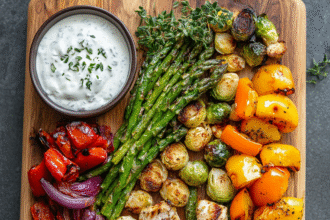The Secret to Eating Carbs Without Gaining Weight: What I’ve Learned About Good Carbs
When people see me mainly eating protein along with fruits and vegetables, the first thing they often ask is, “Why don’t you eat carbs? How do you have energy without carbs if you’re only eating protein and vegetables?”
Here’s the thing: I do eat carbs — just not the ones many people expect. In my regular diet, I don’t eat a lot of rice, bread, or pasta. I might have them occasionally, especially if I’m out and want to enjoy a good meal without being too much trouble. But these aren’t staples for me. What I’ve learned over time is that many people have a very narrow and often incorrect idea of what carbohydrates are.
What People Think Carbs Are
For most, the word “carbs” instantly brings to mind:
- Bread
- Pasta
- Rice
- Baked goods
- Sugary snacks
Because these foods are so common, they’ve come to define carbohydrates in many people’s minds. And because over-consuming these refined carbs can lead to weight gain or energy crashes, carbs as a whole have gotten a bad reputation.
What Carbs Are
Carbohydrates are one of the three main macronutrients (along with protein and fat) that provide energy for your body. Carbs are the body’s preferred source of quick energy.
What many don’t realize is that carbs aren’t limited to pasta or bread. Fruits, vegetables, legumes, and whole grains are all rich in carbohydrates — the kind that nourish our body and keep us energized.
Here’s what carbs do:
- Fuel our brain and muscles
- Provide fiber to support digestion and gut health
- Help regulate blood sugar when consumed in balanced forms
It’s not carbs that are the problem — it’s which carbs and how much we eat.
The Misconception: Carbs Make You Gain Weight
This is one of the most common myths I hear. Yes, overeating of any macronutrient can contribute to weight gain — especially when paired with excess calories and little physical activity. But carbs, on their own, aren’t the villain.
The real issue?
- Over-reliance on refined carbs due to lack of knowledge and long-term habits (white bread, white rice, pastries) that spike blood sugar
- Large portions without balancing with protein, fat, and fiber
- Highly processed foods that are low in nutrients and high in empty calories
The Side Effects of Eating Bad Carbs
When people rely heavily on refined and processed carbs, the side effects can be significant:
- Drastic weight gain — These foods are typically low in nutrients but high in calories, making it easy to consume too much without feeling full.
- Increased risk of high blood sugar and insulin resistance — White flour products, in particular, can cause sharp spikes in blood sugar, leading over time to creating insulin resistance and increased risk of type 2 diabetes.
- Nutritional gaps — Processed carbs often lack the vitamins, minerals, and fiber our body needs.
- Cheap and over-consumed — Because these foods are inexpensive and have traditionally been a staple energy source, they’re often consumed in excess, further contributing to weight gain and poor health outcomes.
This is why it’s so important to shift focus toward carbs that offer proper nourishment.
The Good Carbs I Choose

In my daily life, I prioritize carbohydrates that come from whole, nutrient-dense sources. These provide me with energy, fiber, vitamins, and minerals without causing blood sugar spikes or crashes.
Here’s what my carb intake looks like:
- Fruits — apples, berries, bananas, citrus, mangoes, kiwis, bananas and most seasonal fruits
- Vegetables — cauliflower, asparagus, peppers, broccoli, spinach, carrots, zucchini, Brussels sprouts. The list is very long; I love all types of vegetables.
- Sweet potatoes and regular potatoes — are excellent sources of complex carbs and fiber; I mostly eat sweet potatoes.
- Quinoa — a complete plant protein and a fantastic complex carb; I eat it occasionally
- Oatmeal (occasionally) — warm, comforting, and rich in soluble fiber
These foods fuel me throughout the day without the heaviness I used to feel from large servings of refined carbs.
What I Tend to Avoid
I don’t eliminate any food group, but I do limit these in my regular diet:
- White flour products — white bread, bagels, pastries
- Pasta — I enjoy it only occasionally, usually if I’m at a great Italian restaurant; I love seafood pasta.
- White rice — I’ll have it sometimes, but it’s not a regular part of my meals
The key for me is that carbs should support my energy, not deplete it or cause unnecessary cravings.
Why Fruits and Vegetables Are Fantastic Carb Sources
Many people don’t realize that fruits and vegetables are some of the healthiest carbs you can eat. They provide:
- Natural sugars that come packaged with fiber slow absorption and prevent blood sugar spikes
- Vitamins and minerals that support every system in your body
- Antioxidants that help fight inflammation
When you fill your plate with these kinds of carbs, you’re giving your body the fuel it needs without the pitfalls of processed carbs.
A Balanced Approach to Carbs
Here’s what I’ve found works:
- Focus on whole foods. Carbs from whole fruits, vegetables, and grains work with your body.
- Watch portions of refined carbs. When you do have bread, pasta, or rice, enjoy it mindfully and in moderation.
- Pair carbs with protein and your favorite healthy fats. This helps keep our blood sugar stable and energy steady.
Carbs Aren’t the Enemy
Carbohydrates have been unfairly demonized, mainly because of how we’ve come to define them in our culture. When you understand that carbs come in many forms — and that whole, unprocessed sources like fruits, vegetables, and whole grains are deeply nourishing — you can make choices that energize and support your body.
It’s not about cutting carbs; it’s about choosing carbs that work with your health goals, not against them.







